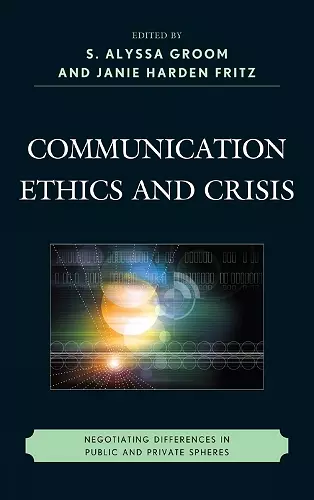Communication Ethics and Crisis
Negotiating Differences in Public and Private Spheres
Format:Paperback
Publisher:Fairleigh Dickinson University Press
Published:12th Mar '14
Currently unavailable, and unfortunately no date known when it will be back
This paperback is available in another edition too:
- Hardback£81.00(9781611474497)

This collection of essays extends the conversation on communication ethics and crisis communication to offer practical wisdom for meeting the challenges of a complex and ever-changing world. In multiple contexts ranging from the intrapersonal, interpersonal, and family to the political and public, moments of crisis call us to respond from within particular standpoints that shape our understanding and our response to crisis as we grapple with contested notions of "the good" in our shared life together. With no agreed-upon set of absolutes to guide us, this moment calls us to learn from difference as we seek resources to continue the human conversation as we engage the unexpected. This collection of essays invites multiple epistemological and methodological standpoints to consider alternative ways of thinking about communication ethics and crisis.
In this unified collection, Groom and Fritz (both, Duquesne Univ.) feature prominent and rising American ethics scholars. In three distinct sections, these essays establish that crisis reactions can be understood through the presentation of a narrative; investigate the idea of a productive distance between a crisis and the responder, despite the impossibility of mastering the crisis; and distinguish the differences between public and private contexts. The editors assert that a banal view of crisis has developed due to its increased permeation of public and private spheres. Celeste Grayson Seymour confirms this position in her essay, 'Understanding Anxiety: The Crisis of Ethical Choice'; she explains that this universal human crisis is due to the restless state of existence. In 'The Crisis Fallacy: Egoism, Epistemology, and Ethics in Crisis Communication and Preparation,' Pat Gehrke (Univ. of South Carolina) invites the reader to turn unreflective engagement into reflective engagement. This unique collection extends the conversation on communication ethics and crisis communication through its multiplicity of perspectives. Summing Up: Recommended. Upper-division undergraduates through researchers/faculty. * CHOICE *
Over the course of nine essays broadly centered on the titular theme, the collection largely follows through on that promise, offering a variety of pragmatic, phenomenological approaches to ethical decision-making in crisis situations Interesting, and at times insightful into the nature of humankind’s engagement with crisis Communication Ethics and Crisis offers a variety of methodological approaches for viewing ethical communication and/or crisis; for that, the collection has value for scholars of either or both. Scholars looking for practical approaches to crisis communication will find material of interest here, as will those whose interests lie in the foundational theories governing out understanding of crises both material and philosophical Groom and Fritz’s compilation contributes material both reflective and forward-looking to larger conversations about ethics and crisis response in a postmodern world; those engaged in such conversations would do well to take a look * Rhetoric Review *
[T]his collection offers readers a chance to negotiate different postmodernist approaches to understanding communication ethics and crisis. * Journal of Media Ethics *
ISBN: 9781611476958
Dimensions: 231mm x 155mm x 14mm
Weight: 304g
196 pages